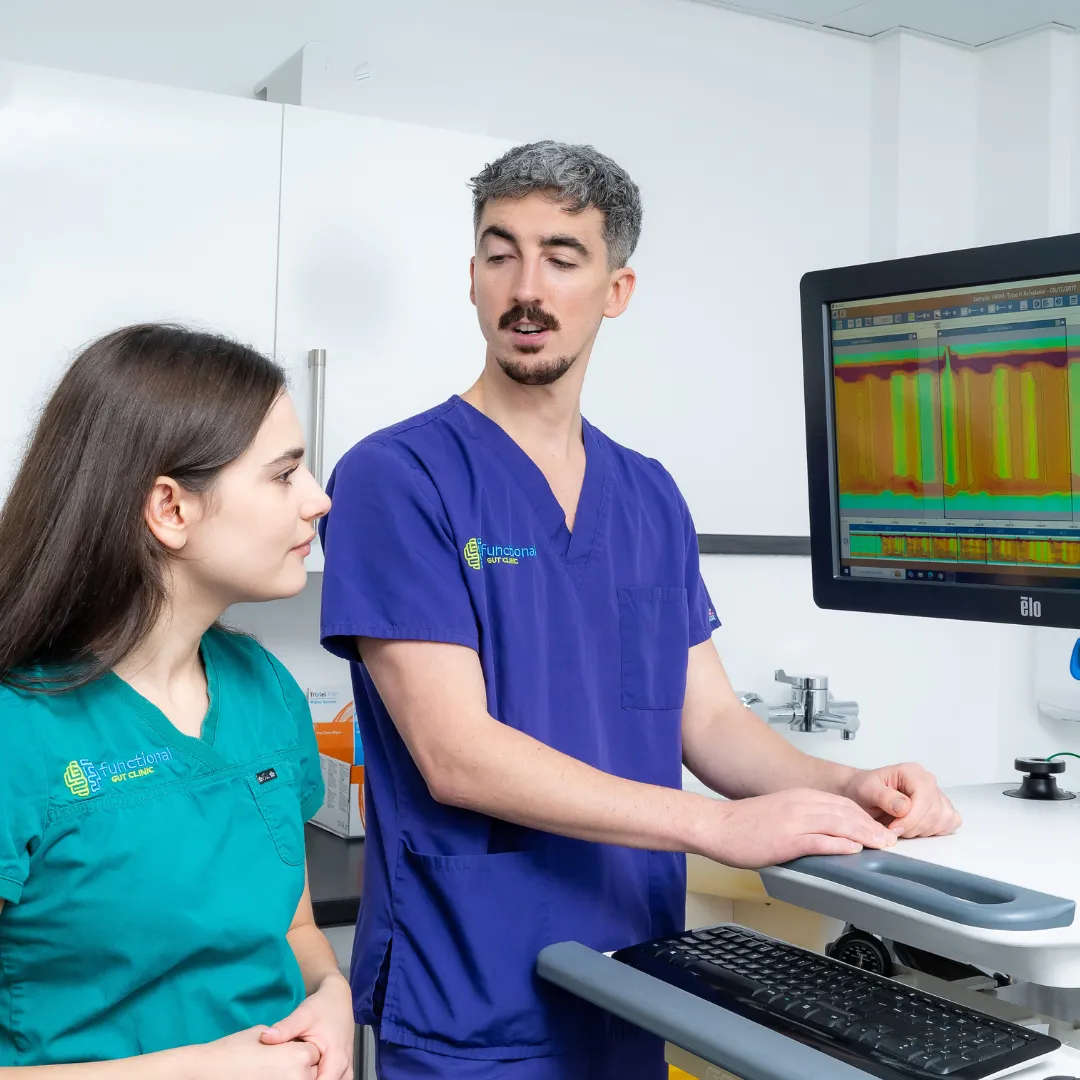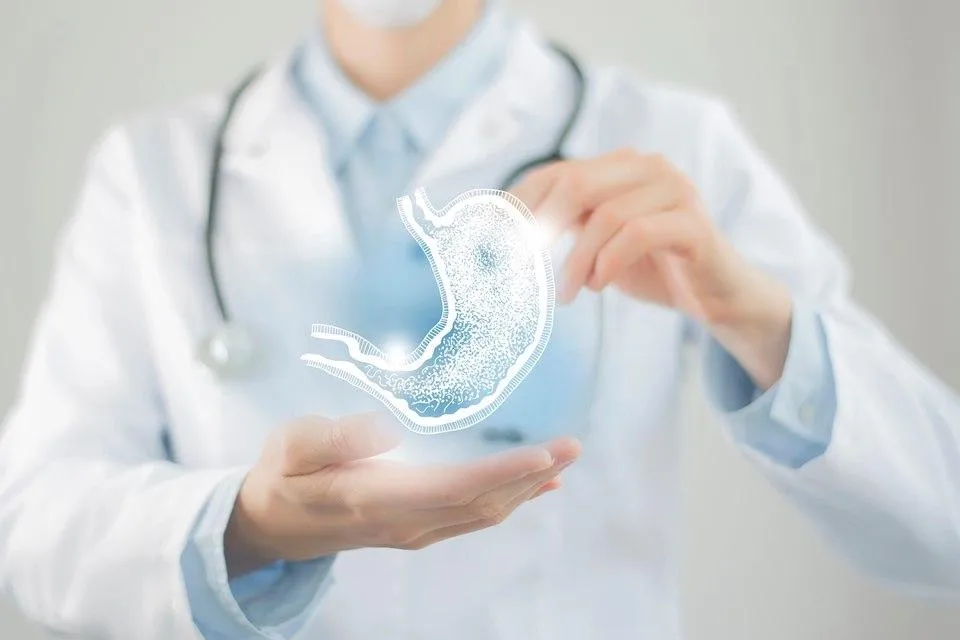Bloating
Struggling with bloating? Here’s what you need to know to find relief.
ALL TEST ARE ACCREDITED & REGULATED BY



What is bloating?
When you’re bloated, your stomach or abdomen can feel full and uncomfortable, or even painful.
This bloating happens when your gastrointestinal tract contains too much gas or air. Bloating can be mild, or more severe, and may present as:
– A visibly distended or swollen abdomen
– Feeling very full and uncomfortable
– Feeling of tightness in the abdomen
– Excess gas – belching and/or flatulence
– Rumbling or gurgling
There are several causes of bloating, so it’s important to diagnose the cause of your bloating and find out why it’s happening to you.

Why does bloating happen?
Prolonged periods of bloating could indicate an underlying health problem, if so you should see your GP.
Possible causes can include:
Irritable bowel syndrome (IBS diagnosis)
Ulcerative colitis, a form of inflammatory bowel disease (IBD), where the inner lining of the large bowel is inflamed and develops ulcers
Crohn’s disease, the other form of IBD, where some parts of your colon are inflamed
Too much bacteria in your small intestine (called small intestinal bacterial overgrowth, or SIBO)
Gastroesophageal reflux disease
Food intolerances, especially lactose or fructose intolerance
Producing too much gas (dysbiosis and fermentation)
Weight gain
Stress or anxiety
Delays in your food and drink moving on from your stomach (called gastroparesis)
Eating too quickly, so that you swallow too much air (called aerophagia)


Diagnosing bloating
Feeling bloated is no fun, but once you know what’s going on you can start to manage your symptoms and the underlying causes.
Testing options:
At the Functional Gut Clinic, we can run the following tests to diagnose the causes of bloating:
Gastric emptying test– which measures how quickly food leaves your stomach
Carbohydrate malabsorption breath test– which finds out if you have certain food intolerances (lactose or fructose)
Small intestinal bacterial overgrowth (SIBO) breath test– which finds out if you have an overgrowth of bacteria in your small intestine (called SIBO)
Oesophageal manometry– which measures the function of your oesophagus (food pipe)
24-hour pH impedance monitoring– which looks at whether you have any reflux
Colonic transit study-a non-invasive test which looks at how long it takes for faeces to pass through your bowl
Learn more about bloating

Gastroparesis: Causes, Diagnosis, and Treatment
Gastroparesis is a chronic condition where food passes through the stomach slower than normal. It occurs because the nerves that trigger stomach emptying aren’t as effective as usual. There is no obstruction or structural abnormality.
The underlying cause behind gastroparesis isn’t known but it has been linked to diabetes, surgery, and viral illnesses. Patients with gastroparesis commonly experience nausea, vomiting, and stomach pain.
What is Gastroparesis?
Gastroparesis, or delayed gastric emptying, is a long-term condition where food moves through the stomach at a slower pace.
Usually, the muscles in the stomach are well co-ordinated and have the necessary strength to move stomach contents out of the stomach and into the small intestine. However, when this becomes impaired, stomach contents remain in the stomach longer than usual.
Gastroparesis is thought to affect around 13 per 100,000 people. It can occur in people of all ages but is more common in older people and women.
Gastroparesis Symptoms
Gastroparesis isn’t always experienced the same way in everyone. The symptoms can range from mild to severe.
Common gastroparesis symptoms include:
Nausea
Vomiting (especially undigested food)
Early satiety (feeling full quickly)
Bloating
Abdominal pain or discomfort – typically experienced in the upper stomach, representing a dull or sharp pain.
Loss of appetite
Weight loss
Acid reflux or heartburn
Erratic blood sugar levels (especially in diabetics)
In some cases, the person may have no symptoms at all (asymptomatic).
What Causes Gastroparesis?
The underlying cause behind gastroparesis is not known. Doctors understand that it’s connected to the nerve supply. However, why this nerve supply becomes damaged or dysfunctional isn’t clear.
Doctors classify gastroparesis causes into three categories:
Idiopathic, or unknown, simply means doctors cannot identify the cause. It’s believed that some people have a stomach that’s either overly sensitive to nerve signals or cannot react properly to a meal, playing a role in the condition. Around 36% of cases have no identifiable cause.
Diabetes is commonly linked to gastroparesis. Repeatedly high blood sugar levels can cause nerve damage throughout the body. If this affects the vagus nerve – which regulates your digestive system – it can cause permanent gastrointestinal (GI) dysfunction.
Post-surgical dysfunction occurs when GI surgery damages the nerves in the abdomen, leading to dysfunctional stomach contractions, and therefore gastroparesis. This accounts for about 13% of cases.
Usually, when medical professionals cannot provide a precise cause behind a condition they look for risk factors to determine the likelihood of an individual having the condition. The risk factors for gastroparesis include:
Diabetes (especially poorly controlled)
Previous abdominal surgery
Viral infections
Neurological disorders (e.g. Parkinson’s, MS)
Autoimmune diseases
Medications that slow digestion (e.g. opioids, anticholinergics)
Hypothyroidism
Eating disorders (e.g. anorexia, bulimia)
Gastroparesis Diagnosis
Gastroparesis can be difficult to diagnose. There is no obstruction or physical change that will show up on a scan. Your doctor will begin by asking questions about your medical history and performing an examination.
Next, your doctor will want to eliminate other potential causes. They may request:
An ultrasound to view your organs, ruling out liver disease, pancreatitis, and gallbladder disease.
Blood tests to assess for diabetes or other conditions.
An upper endoscopy to look for blockages and other conditions.
If these tests are negative, your doctor will consider a physiological problem like gastroparesis. It's important to distinguish gastroparesis from conditions like functional dyspepsia, which shares similar symptoms but often involves normal gastric emptying. These tests assess GI function and speed. You may undergo:
Gastric emptying scintigraphy involves eating a small portion of food with a harmless radioactive substance which shows up on x-rays. Your doctor can then see how fast the food is digested and emptied from your stomach.
Carbon-13 labelled breath test involves eating a small meal (often porridge) containing a carbon-13 labelled substance which can be measured in breath. Following the meal, you provide breath samples over a 4-hour period. The rate at which your breath no longer contains the carbon-13 substance can determine how quickly or slowly your stomach empties.
How is Gastroparesis Treated?
Gastroparesis cannot be cured. If the underlying cause is diabetes, the priority is to improve blood sugar control. This will prevent the condition from worsening. Otherwise, treatments typically involve dietary changes or medication.
Medication
People with gastroparesis often experience nausea and other symptoms. Certain medications can help to relieve these symptoms. For example, domperidone, metoclopramide, and erythromycin can help stimulate stomach muscles, ondansetron and prochlorperazine can control nausea and vomiting, and antidepressants like mirtazapine and bupropion affect the nerves themselves.
Dietary Changes
Recommended dietary changes for gastroparesis include:
Eating smaller, more frequent meals.
Eating softer foods and lots of fluids.
Avoid hard-to-digest foods such as raw vegetables, broccoli, or fruits with a skin.
Chew thoroughly before swallowing.
Limit fat intake.
Wait two hours after eating before lying down
Ready for Relief from Regurgitation?
If you’re dealing with symptoms of gastroparesis such as food or acid flowing back into your mouth (regurgitation), persistent heartburn, or unexplained throat pressure, don’t wait to get a diagnosis.
The Functional Gut Clinic offers expert diagnostic tests – like gastric emptying breath tests to diagnose gastroparesis, as well as 24-hour pH/impedance monitoring and esophageal manometry to identify any acid-reflux or swallowing-related issues.
Hear from people we’ve helped, just like you.
"Very professional while welcoming and friendly"
"The manner and demeanour of all staff from reception to people carrying out the test was very professional but welcoming and friendly. Atmosphere is very relaxed and all instructions clear and concise."
London Patient

"Highly recommend this"
"Thanks to Dr Hobson and everyone at the Functional Gut Clinic. The whole team is very kind and generous and they are doing things that are cutting edge and they actually get results."
Manchester Patient

"Highly recommend this"
"After stopping my lansoprazole, every time I had a warm drink, I could feel it burn all the way down to my stomach. Thank you to Sam for making me feel at ease." - Manchester Patient

"My experience could not be better"
"Pleasant and knowledgeable staff that made the experience more enjoyable than it should be!" - London Patient

"Very friendly and knowledgeable"
"An excellent service from beginning to end. I would recommend to anyone who was considering having testing done. Very friendly and knowledgeable!" - Manchester Patient

"Very kind and helpful"
"It was also great to have time to talk to the clinicians – very important when you have problems. Reception staff also very kind and helpful." - Manchester Patient

Are you experiencing any other symptoms
Symptoms are often closely connected. Find out more below.
Reflux

Burning mid-chest, worse when bending or lying down
Constipation

Difficulty going to the toilet, unusual stools, often with stomach ache or intestinal cramps, bloating, nausea or appetite loss
Heartburn

A burning pain in your chest, just behind your breastbone.
The pain is often worse after eating...
Regurgitation

Bringing food or drink back up, difficulty swallowing, feeling that food or drink is stuck in your throat, horrible taste in your mouth
Swallowing Issues

Dysphagia - difficulty swallowing, feeling that food or drink is stuck in your throat, horrible taste in your mouth
Diarrhoea

Loose or explosive stools, can’t get to a toilet in time
Abdominal Pain

Cramps; sharp or dull pain, Bloating, Excessive belching, Nausea or vomiting
Faecal Incontinence

Stools leak unexpectedly, Can’t get to a toilet in time
IBS

Abdominal pain or cramping, bloating, changes in bowel habits and urgency, gas

